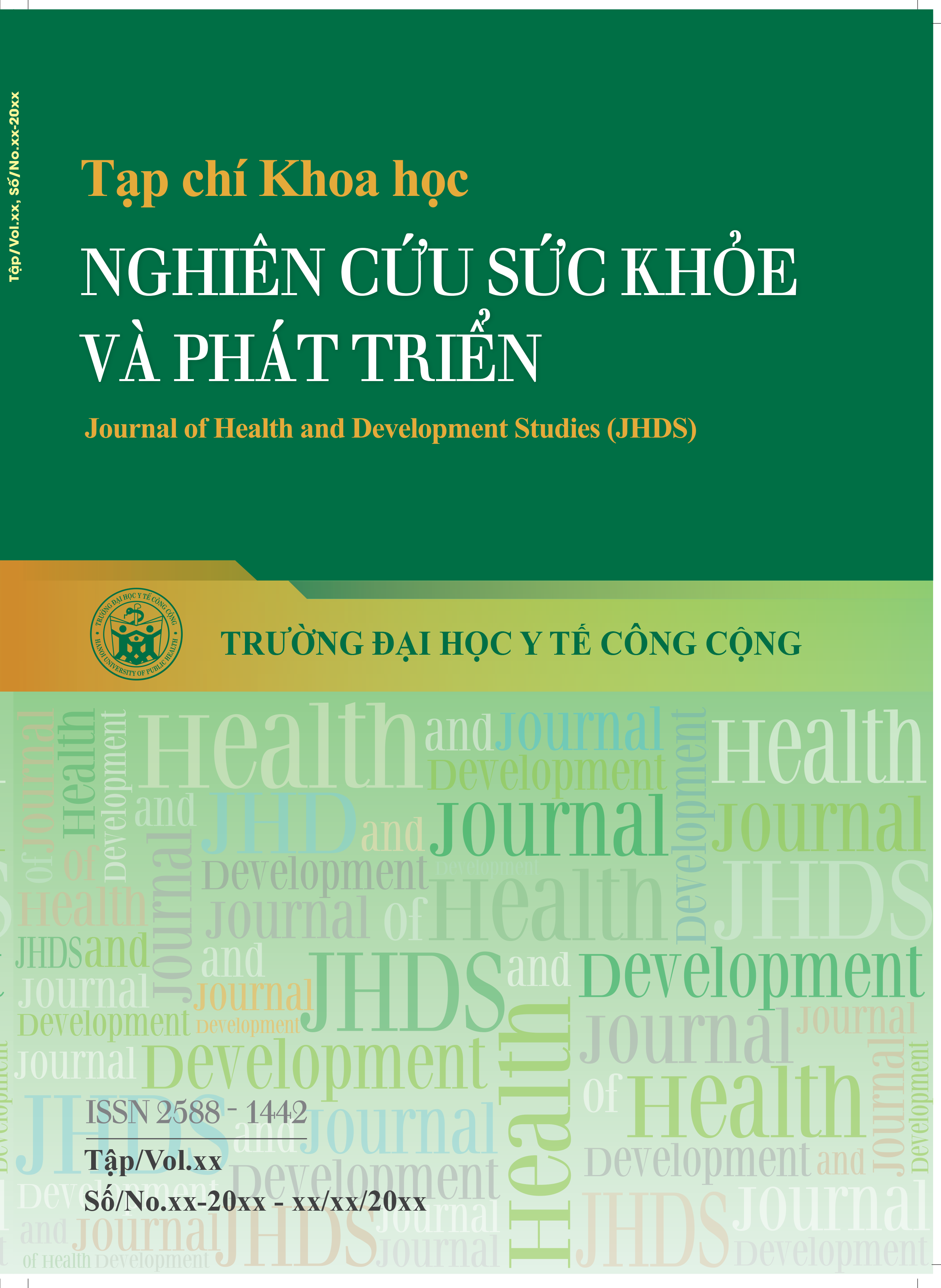Tạp chí
Khoa học Nghiên cứu Sức khỏe và Phát triển
(Journal of Health and Development Studies – JHDS)
Trường Đại học Y tế công cộng
ISSN (Print): 2588-1442
ISSN (Online): XXXX-XXXX
https://jhds.edu.vn
A review on hand hygiene complicance by medical staff of hospitals worldwide
- Mã bài báo : SKPT_24_057
- Ngày xuất bản : 30/08/2024
- Số trang : 73-83
- Tác giả : Phan Thi Thu Trang
- Lượt xem : ( 326 )
Danh sách tác giả (*)
- Phan Thi Thu Trang 1 - Hanoi University of Public Health
- Nguyen Thi Bich Thao 1 - Hanoi University of Public Health
- Nguyen Quynh Anh 2 - Hanoi University of Public Health
- Le Tu Hoang 3 - Hanoi University of Public Health
Objectives: Hand hygiene among healthcare workers is crucial as their hands can transmit microbes between patients and the environment, leading to hospital-acquired infections (HAIs). HAIs are significant challenges in healthcare facilities, with rates of 5% in Europe and 5.7% to 19.1% in low- and middle-income countries. Vietnam faces similar issues, with HAI rates ranging from 3.5% to 10% of hospital admissions. Numerous studies have shown that adherence to hand hygiene practices is essential to reducing HAIs. This study aims to i) Describe the current adherence to regular hand hygiene compliance and 2) Describe the factors influencing adherence of regular hand hygiene compliance among health staff in hospitals worldwide.
Methods: We conducted a narrative review on hand hygiene compliance. The review included original studies in English, published within the last 10 years, assessing hand hygiene compliance using an assessment tool, and analyzing related factors.
Results: Out of 988 retrieved publications, 899 articles were excluded due to duplication or insufficient criteria. After abstract screening, 80 full-text studies were reviewed. Findings indicated generally low hand hygiene compliance, particularly in low-income countries. High-income countries had higher hand hygiene compliance rates and knowledge levels among health staff. Significant differences in compliance rates were observed before and after patient contact. The main factors influencing compliance rates were knowledge, awareness, job position, and years of experience of health staff.
Conclusions: Comprehensive training and educational programs on hand hygiene, regular monitoring, and constructive feedback are essential to improve compliance among healthcare staff and reduce HAIs, particularly in low-income regions.
- DOI : https://doi.org/10.38148/JHDS.0804SKPT24-057
- Chủ đề : Mô hình sức khỏe, ốm đau, bệnh tật, chất lượng cuộc sống
- Loại bài báo : Bình luận
- Chuyên nghành : Chuyên Ngành Y
 Thông tin liên hệ : Phan Thi Thu Trang
Thông tin liên hệ : Phan Thi Thu Trang Email : pttt@huph.edu.vn
Email : pttt@huph.edu.vn Địa chỉ : Hanoi University of Public Health
Địa chỉ : Hanoi University of Public Health
Bài báo liên quan
- Care competencies of nurses at clinical departments: A cross-sectional study in Bac Giang provincial general hospital of Vietnam
- COVID-19 pandemic experiences and psychological well-being of a Vietnamese university student sample in Hanoi, Vietnam
- Association between performance status and Quality of life in advance stages non-small cell lung cancer patients
- Direct medical costs among patients with type 2 diabetes mellitus with complications at Thieu Hoa District General Hospital, Thanh Hoa province, Vietnam in 2023
- Risk Factors for Anxiety Disorders among Men Who Have Sex with Men (MSM) in Vietnam
- Knowledge and practice on using single-use plastic products of rural residents in Binh Luc district, Ha Nam province in 2022
- The health seeking behavior of the elderly in a coastal town in Vietnam and some related factors in 2023
- A review on hand hygiene complicance by medical staff of hospitals worldwide
- Quality of life among children with Multisystem Inflammatory Syndrome (MIS-C) at Vietnam National Children’s Hospital in 2022: A Case series study
- Stress among clinical nurses and affecting factors at Military Hospital 120, Tien Giang Province, year 2023
- Related factors of nurses’ working motivation at Hanoi Medical university hospital in 2024
- A case study about the implementation of the regulation on prescription for health insurance out-patients in a general hospital in Vietnam, 2022
- Surgical hand hygiene compliance and its associated factors among medical staff at Hospital 199, Da Nang city, 2022
- The status of work motivation of nurses at Hanoi Medical University hospital in 2024
- Status of vegetarianism and related factors among college students in Hanoi in 2023
Bài viết mới nhất
- Một số trang web hữu ích đối với các nhà khoa học
- Dành cho chuyên gia
- Tạp chí Khoa học Nghiên cứu sức khỏe và Phát triển duyệt tối đa 1,0 điểm ngành Y trong Danh mục Tạp chí khoa học được tính điểm của Hội đồng giáo sư Nhà nước
- CHÚC MỪNG NGÀY BÁO CHÍ CÁCH MẠNG VIỆT NAM (21/6)
- GS.TS Hoàng Văn Minh - Hiệu trưởng Nhà trường 'lọt top' nhà khoa học có chỉ số trích dẫn hàng đầu thế giới

 File toàn văn
File toàn văn